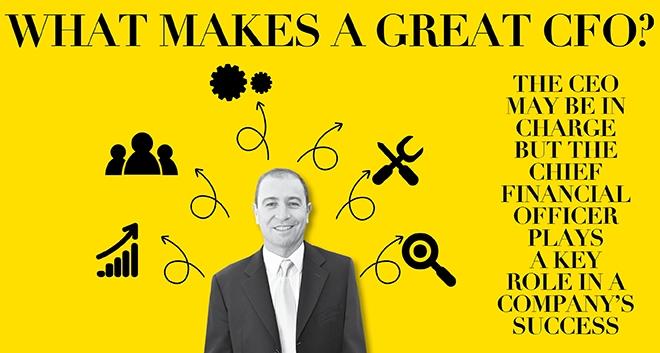In any company, a good industry Finance Manager is obviously necessary and quite valuable. This person will ensure that the accounting data is compiled and recorded accurately in line with the latest accounting standards, monitor and report on the performance of the company, effectively manage its liquidity, establish and maintain internal controls, liaise with the auditors and ensure that the company is tax-compliant. No decent Finance Department can function without the above person.
But a good Chief Financial Officer (CFO) is a completely different proposition. A CFO is a senior manager, part of the leadership team and a person that can bring a lot of added value to a company. He/she will not only lead the finance function but will bring to the leadership team table a great deal of knowledge, insights and a point of view that differs from that of other senior managers.
Bookkeeping and Reporting
The responsibility for the accurate recording of information lies with the Chief Accountant of the company but the CFO ensures that the information is recorded in a timely fashion. Through his/her guidance and an investment in technology and processes, the month end is completed in days and the information can be presented to the leadership team soon after. No matter how accurate the information is, if it is not available when needed then it loses a lot of its value.
More importantly, the CFO is the person who has to analyse and explain the data presented to the leadership team. For example, it is not enough to inform senior management and the Board of Directors that personnel costs are above the budgeted or the previous year’s figures. The CFO should be in a position to use the data available through the accounting systems and explain the negative variance. The increase in costs might be the result of salary increments, increased activity, or reduced productivity. Depending on this analysis, the CFO should recommend different corrective measures that can be discussed with the rest of the leadership team. In addition, he/she should develop useful KPIs (e.g. overtime ratio, absence ratio) and report on them on a monthly basis to expand the management’s understanding of the figures and trends.
Finally, the CFO has the role of a medium! He has to look into his/her crystal ball in the finance department and predict the future. Budget, profit & loss account, cash flow projections, new project investment estimates are all reports that the leadership team needs in order to reach the right decisions that will positively affect the long-term future of the company. The CFO has to use the historic data and the systems available to him/her together with accumulated experience, knowledge and intuition to improve the accuracy of these projections.
360⁰ Strategic View
It is not enough for the CFO to be focused only on the Finance Department and the financials of the company. He/she has to have a 360⁰ view of the whole organisation and understand its strategic direction and options.
Firstly he/she should be in a position to comprehend, assess and analyze information produced by other departments. If we take the example of the previous section of the higher personnel costs, the CFO should have access to information in the HR, Operations and Payroll systems and understand how this data affects the financial data. If, for instance, the problem is one of low productivity, this will be evidenced by the higher number of Full Time Employees (FTEs). This data is produced by the Operations system.
Furthermore the CFO should be aware of information outside the organisation in order to be in a better position to advice the Board and his/her colleagues. An organisation does not operate in vacuum. On the contrary, it operates in a very dynamic, ever- changing environment in which the actions of customers, suppliers, competitors or government bodies can sometimes be more important that even the actions of the company. Having access to this kind of information will allow the CFO to (a) explain more accurately the company’s performance and (b) participate effectively in the setting of its strategic direction.
In conclusion, a CFO should have access to a broad range of information in order to fully understand the drivers that impact financial performance.
Cross-Department Involvement
In addition to utilizing information produced by other departments, a good CFO should be involved in projects and activities that are not limited to the Finance Department. Therefore his/her presence and influence should extend to the whole organisation.
Cost saving is a good example. Most costs are incurred by other departments and are the responsibility of other managers. The CFO, though, is in a prime position to know the numbers and usually, by nature, has a cost-saving mentality and an awareness of the impact of a lack of such a culture. Cost saving has been particularly important in recent times, due to the financial crisis that engulfed the business community in Cyprus, but it is always relevant because a company will never be able to compete effectively if its costs are higher than those of its competitors. The CFO should therefore lead the cost-saving project but, in order to be successful in this endeavour, the input and collaboration of other department managers is a prerequisite.
A CFO will probably play a role in the procurement of the company (assessment of offers, negotiations) and may be involved with sales (customer profitability analysis, pricing), human resources issues, legal issues, IT and other costs departmental issues and projects.
People Management
As a senior manager, a CFO has to be able to manage and influence people. The role dictates that the bulk of the Finance Department workload will be the responsibility of others and functions like financial reporting, treasury, credit control, etc., will be carried out by subordinates. The CFO has to lead these people and is responsible for recruiting the right professionals, identifying those with prospects and developing them.
Technically, he/she should be at a level above his team but not be involved in the detailed work. The CFO should supervise the team and spend time on more value added activities, while being available at any time to support his/her staff, offer advice, assign responsibilities and assess the progress of people and projects. He/she should create a strong team spirit, manage people’s expectations, inspire them to work harder and smarter; in a word: the CFO must lead them.
Again, the CFO’s management of people is not restricted to the Finance Department. As the senior Finance Executive of the company, he/she will liaise with both external and internal associates. Internally the CFO will be involved in many cross-department projects, presenting data and information to other managers and departments, participating in the company’s decision-making process, supervising the internal controls systems of the whole organisation and being the key liaison among departments. Externally, the CFO will be managing important relations with a number of stakeholders, including shareholders and banks, may be involved in tough negotiations with suppliers and may even participate in meetings with customers. On all these occasions, the CFO’s people skills will be crucial in managing these relationships, promoting the financial interests of the company and achieving challenging goals.
Leadership Qualities
Above all, a CFO is a leader, not a follower. His/her main job is to provide a clear- minded, unemotional, factual view on the many matters that are discussed at senior level. Armed with facts and figures, the CFO should ensure that the decisions taken do not ignore the financial or business reality. Many decisions are taken for the wrong reasons, e.g. union pressure, to please people, throwing good money after bad, etc. No matter what the pressure, the CFO should have the personality to object if the decision- making process is not supported by an objective analysis of the data.
Conclusion
The CFO is part of a company’s leadership team. His/her role these days is a multi-faceted one: leading the finance function and assisting the sales team to close a deal, the operations department to reduce the costs and the purchasing department in negotiations with suppliers. The CFO should build a culture of cost-consciousness and profit focus and provide the CEO and the Board with fact-based, intuitive data and analysis that ensure that the decisions taken will lead the organisation to success.
















